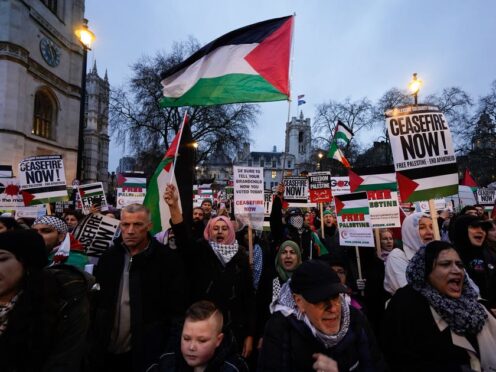
The cost of policing Gaza-related protests in London has reached over £32 million, as major marches are planned across the capital on Saturday.
A Palestine Solidarity Campaign (PSC) march will take place in central London, with this weekend being the fifth major demonstration of the year so far.
The group said it was expecting “hundreds of thousands of people” to march from Hyde Park Corner to the US Embassy.
The Metropolitan Police said the policing of such protests since October 7 had required 35,464 officer shifts and more than 5,200 officer rest days to be cancelled, at costs of £32.3 million.
It added that a “robust policing plan” was in place for a “busy weekend in the capital”.
Commander Karen Findlay, who will oversee policing across London on Saturday, said people committing criminal offences during protests would be dealt with “decisively and swiftly”.
In a statement, Ms Findlay said: “We are clearly operating in a context where we understand our Jewish and Muslim communities continue to be highly concerned about antisemitic and anti-Muslim hate crime and their own sense of safety in London.
“We recognise the very real anxiety and fear of individuals who are worried about perceived or actual threats they are subject to.
“Our role remains to police impartially, being robust in tackling hate crime and extremism, and ensuring protest is managed within the law.
“We have to police to the law as it is, not as others would wish it to be.”
It comes as the Government’s counter-extremism tsar warned that London’s streets have become a “no-go zone for Jews” during pro-Palestine protests.
Robin Simcox said a “permissive environment for radicalisation” was developing as he welcomed the Government’s forthcoming new definition of extremism.
PSC director Ben Jamal said: “Despite further attempts by Government Ministers, including the Prime Minister, and Lord Walney, to demonise those protesting and suppress calls for a ceasefire, hundreds of thousands will again be taking to the streets, calling for an end to Israel’s genocidal war on the Palestinian people.
“We will continue to protest until a ceasefire is called, and until there is an end to all UK complicity with Israel’s decades long oppression of the Palestinian people.”
The organiser of a counter-protest to the pro-Palestine marches in London said such demonstrations mean “Jews can’t go out in the street”.
Itai Galmudy said that pro-Palestine demonstrations had created “no-go zones for Jewish people” in the capital and “ballooned into anti-Israeli hate marches”.
Mr Galmudy said he organised Saturday afternoon’s counter-protest with a “collective of people that share the same frustrations” with the pro-Palestine marches.
He said he was “very concerned” that counter-protesters might encounter violence, adding that it would “probably reflect” in the number of people attending the demonstration in Victoria, central London.
Mr Galmudy told the PA news agency: “We will just not accept that Jews can’t go out in the street because somebody wants to protest.
“Those marches have ballooned into anti-Israeli hate marches and we think it’s enough. We don’t want to live in fear and we will not accept it.
“We want to exercise our democratic right to stand up and tell them that it’s not okay.
“There is no room in our society for protests that don’t allow other people to live next to them.”
Mr Galmudy said he was expecting “50-100 people maximum” to attend the counter-protest, adding “people are afraid and not everybody’s willing to take the risk”.
He said: “We know that those (pro-Palestine) protests are not as peaceful as some people tell us they are.
“I’m concerned for this country because letting the mob run a country is not the way. There is a law and we should all be held accountable to it.”

Enjoy the convenience of having The Sunday Post delivered as a digital ePaper straight to your smartphone, tablet or computer.
Subscribe for only £5.49 a month and enjoy all the benefits of the printed paper as a digital replica.
Subscribe